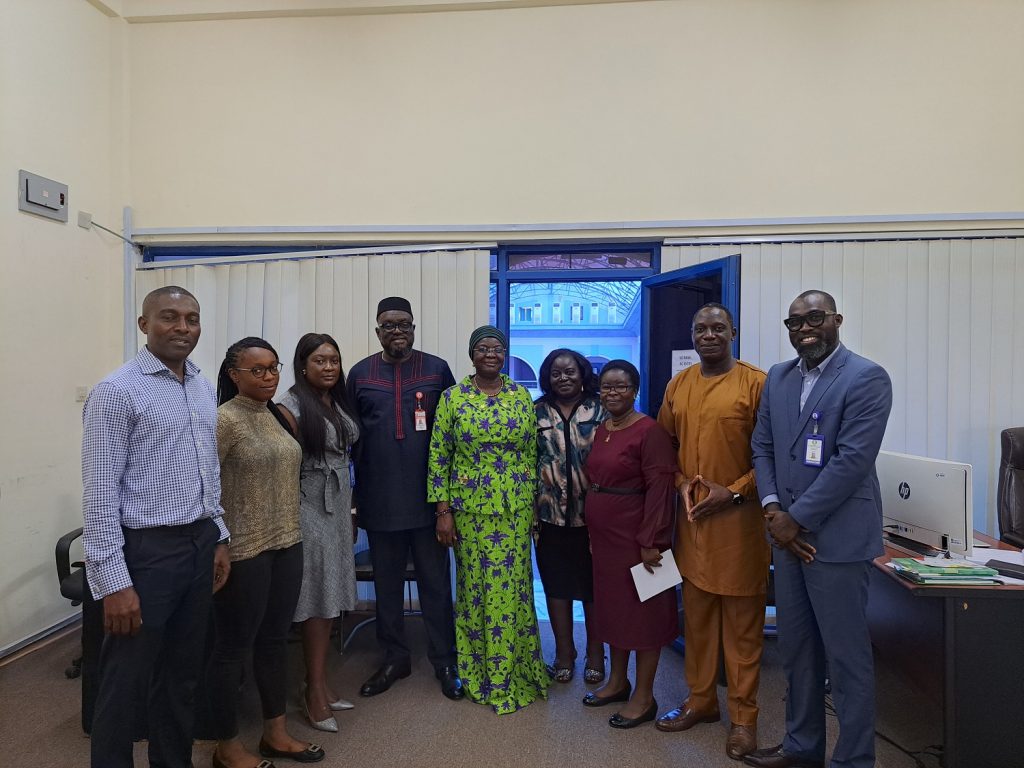The Commissioner for Economic Affairs and Agriculture Visits the West Africa Unique Identification for Regional Integration and Inclusion (WURI)
The Commissioner for Economic Affairs and Agriculture Visits the West Africa Unique Identification for Regional Integration and Inclusion (WURI)
The staff of the West Africa Unique Identification for Regional Integration and Inclusion (WURI) Project Implementing Unit (PIU) on Monday 25 July 2022 met with the Commissioner for Economic Affairs and Agriculture, Ms Massandjé Toure-Litse.

The visit is the first encounter of the Commissioner with the staff since she was endorsed by the Authority of Heads of State and Government of ECOWAS on 3rd July 2022 in Accra, Ghana, to lead the newly created Commission for Economic Affairs and Agriculture.
The Director of Free Movement who is also the WURI Project Coordinator, Mr. Albert Siaw-Boateng, and who took the Commissioner round, briefed her on the goal and objectives of the project, key milestones achieved, key activities planned in the year 2022 and also the roles and responsibilities of the PIU staff made up of a Project Manager, a Financial Management Specialist, a Procurement Specialist, a Programme Assistant and a Communication Assistant. The Commissioner congratulated the Director and his team for the progress made so far and promised her unflinching support to ensure that the WURI project meets its set objectives for the benefit of all stakeholders.
The WURI project is a World Bank-financed project aiming to implement a multiphase programme with an overall Programme Development Objective (PrDO) of increasing the number of persons in participating Member States who have government-recognised proof of unique identity that facilitates their access to services. The programme relies on the ECOWAS Protocol of Free Movement of Persons, Right of Residence and Right of Establishment and is designed in two phases with a combined financing envelope of USD395.1 million. Phase 1 which covers Côte d’Ivoire, Guinea and the Commission was approved by the International Development Association (IDA) on 31st May 2018 and is expected to close on 3rd July 2024. Phase 2 which covers Benin, Burkina Faso, Niger, and Togo was approved on 28th April 2020, and has an expected closing date of 30th July 2026. The whole programme is expected to close on 3rd July 2028.
The IDA, through the World Bank provided a US$ 5 million grant to the ECOWAS Commission within phase 1 to enhance and foster inter-agency collaboration and strengthen engagement across the ECOWAS Member States through the facilitation of regional dialogue for mutual recognition of foundational identity (fID) systems that enables access to services.
Overall, the programme targets to provide a Unique Identification (UNI) to about 100 million people by 2028 – that is about 27 percent of the population in the ECOWAS region. The rationale behind this project is that (1) about 53 percent of the ECOWAS region’s population are unregistered and do not have proof of identification despite the high level of intra-regional mobility estimated at 70 percent of the population; and (2) the lack of identification limits people’s access to critical services and hinders them becoming full members of the society. Identification is an important tool and is a key enabler for eradicating poverty and for achieving a broad range of development outcomes.
The project aligns with ECOWAS Vision 2050, particularly goals relative to (1) Economic Integration and Interconnectivity, (2) Transformation and Inclusive and Sustainable Development and (3) Social Inclusion as well as Target 16.9 of the Sustainable Development Goals (SDGs) which recognised the centrality of proof of identification in assuring an inclusive world: to “provide legal identity for all, including birth registration” by 2030.





